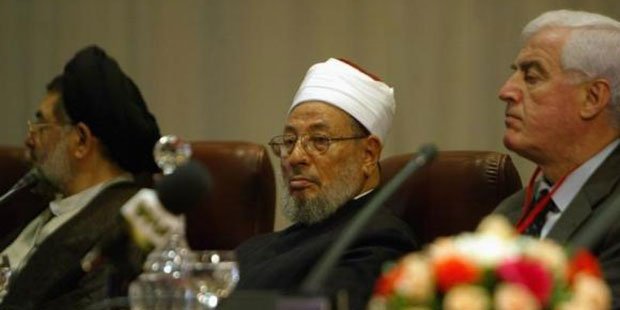 Islamist scholars led by influential Qatar-based cleric Youssef al-Qaradawi urged Arab and Islamic states on Thursday to protect Sunni Muslims in Iraq, where sectarian war threatens after Sunni Islamist insurgents overran much of the country’s north.
Islamist scholars led by influential Qatar-based cleric Youssef al-Qaradawi urged Arab and Islamic states on Thursday to protect Sunni Muslims in Iraq, where sectarian war threatens after Sunni Islamist insurgents overran much of the country’s north.
Fighters from the radical Islamic State of Iraq and the Levant (ISIL) seized a swathe of northern Iraqi towns last week in a southwards thrust towards Baghdad, stunning the country’s Shiite Muslim-led central government.
The United States is considering an Iraqi request to launch air strikes on ISIL and Iran’s president said on Wednesday his countrymen would not hesitate to defend Shiite shrines in Iraq.
Iraq’s energy-rich Gulf Arab neighbors, all Sunni monarchies, have condemned ISIL but blame the Baghdad government for the crisis by failing to share power with Iraq’s Sunni minority.
“Sunnis have suffered a great injustice and severe exclusion, so it is natural to make a popular revolution against injustices,” the International Union of Muslim Scholars said in a statement issued from Doha in Qatar.
“The union calls for Arab and Islamic states to prevent any aggression against Sunnis in Iraq, and for the consolidation of efforts to achieve the legitimate rights of all Iraqis.”
Qaradawi is one of the Muslim world’s pre-eminent preachers and maintains close links to the Muslim Brotherhood, which was overthrown and banned in a military takeover in Egypt last year.
Qatar’s backing of the Brotherhood and shelter for Qaradawi has stoked tension with other Gulf monarchies, who oppose them.
But his group echoed recent statements by Gulf states condemning ISIL by rejecting “terrorist” groups it said violate Muslim principles.
“There’s a need for unity for all honorable Iraqis, and a need for them to stand against the danger of sectarian strife and work to stop fighting and start reconciliation,” the Union of Muslim scholars added in their statement.
Iraqi government forces were battling ISIL for control of the country’s biggest refinery on Thursday as Prime Minister Nouri al-Maliki waited for a U.S. response to an appeal for air strikes to beat back the threat to Baghdad.



